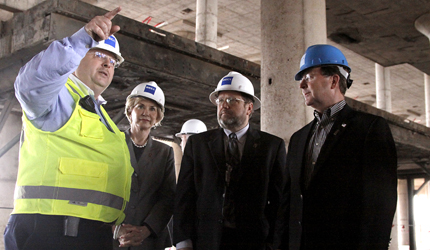
Tommye Lou Davis, vice president for constituent engagement; Dr. Truell Hyde, vice provost of research; and U.S. Rep. Bill Flores listen as BECK senior project manager Hugh Sanford directs their attention toward different project areas of the Baylor Research and Innovation Collaborative on Wednesday at the BRIC construction site.
By Daniel C. Houston
Reporter
U.S. House Rep. Bill Flores visited Waco Wednesday afternoon, touring the construction site of the Baylor Research and Innovation Collaborative and saying he is willing to use his influence to help the program obtain federal grant funding.
Although House Republicans have enacted a moratorium on earmarks to fund projects in congressional districts, Flores said programs like BRIC are still eligible to receive federal funding in the form of research grants.
“In terms of funding, these things don’t have to be funded with earmarks,” Flores said. “As long as it fits a critical national priority and as long as it’s transparent, these things can get funded. …
“If my constituents at Baylor come to me and say, ‘We have applied to the N.I.H. or to you-name-the-agency for this type of grant,’ you can rest assured that I will be using my bully pulpit as a congressman to have that agency make sure that BRIC gets a fair shot. Just because earmarks are gone doesn’t mean the world is going to stop.”
The BRIC tour highlighted the progress made in renovating an old World War II tire factory, originally covered with carbon dust and traces of asbestos, into what Baylor administrators hope will eventually become a world-class research facility. The facility is located at 600 South Loop Drive.
Tommye Lou Davis, vice president for constituent engagement, was pleased with how the tour of the facilities went.
“I think the tour went extremely well,” Davis said. “I feel that [Flores] understands the impact of research as a component of our educational process. The BRIC is going to be significant not only for research but also for economic development and jobs for Central Texas.”
Flores expects BRIC to have a positive impact on the Central Texas economy and said the research efforts being planned could lead more businesses to invest in the area.
“I think that basic research that produces new knowledge is very important for the future economic development of the country,” Flores said, “and I think that BRIC — once it’s up and running — is going to be a great tool, a great resource for Central Texas in terms of doing basic research and applied research.
Dr. Truell Hyde, vice provost for research who largely oversees the progress of BRIC, said that even if the program cannot obtain federal funding, more than $32 million has been secured from local sources like Baylor, Texas State Technical College, and the cities of Waco and Bellmead, among others.
“In the overall scheme of things, appropriations funding is a very small amount of funding compared to other sources,” Hyde said. “The big thing is that you keep the support of your congressmen and senators and we certainly have that.”
Flores also held his first town hall meeting as a congressman Wednesday evening at the Texas Ranger Hall of Fame, during which he addressed his constituents and stressed the importance of reducing the federal deficit, deconstructing the health care legislation President Barack Obama signed into law last session, and scaling back federal entitlement programs like Social Security and Medicare.
“[The federal deficit] is what’s going to ruin your future, right here,” Flores said in an interview with the Lariat. “So we’ve got to fix this as soon as we can. If we don’t, we’re going to leave a terrible legacy for you to have to deal with.”
The town hall meeting offered the opportunity for attendees to offer feedback or ask Flores questions. Topics ranged from funding for preschool education to the possibility of a new constitutional convention to amend the Constitution, to which Flores is opposed.
A recurring concern expressed by three attendees was with Flores’ vote to extend certain provisions of the Patriot Act, which empowers federal agencies to engage in domestic surveillance activities. Flores said the provisions he voted to extend bolster the government’s ability to defend against potential terrorist attacks and only allow for surveillance of foreign suspects, not American citizens.
City of Moody resident Floyd Martin did not feel his belief that the act is unconstitutional was adequately addressed in Flores’ response.
“I’m still concerned about the Patriot Act,” Martin said. “I don’t believe that he informatively answered that. He evidently fails to realize that we’ve got a Fourth Amendment that states that warrants have to be overseen by the judiciary. This special court that he talked about is under the executive branch of government. … They gave authorization for warrantless searches even without any kind of court oversight, and they’ve been conducting them over and over again.”



